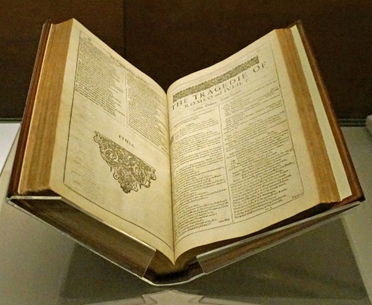
Literary study is socially relevant: from the medieval to the modern, it maps the forces which divide and unite people. English is the global language of cultural exchange and experiment.
The themes of conflict and co-operation are at the core
of the Master's track in English Literature and Culture, a
programme that allows students a broad choice from a range of
modules drawing on the full historical and geographical sweep of
literatures in English.
It is a key tenet of the track that the academic study of English
literature can be used to reflect on the ways that people - as
individuals and as groups - interact with one another, and that it
provides a catalyst for insight into contemporary social debates.
Literature captures the separation and the solidarity of its
writers and audiences in a manner particular to itself: it is a
multidisciplinary practice that is as diverse as the texts it
studies. The programme's core themes of conflict and co-operation
are linked to sustainable
society, a research priority of the university.
For more information see: English Language & Culture.
| Semesters | ||||
|---|---|---|---|---|
| CoursesCourse Catalog > | 1a | 1b | 2a | 2b |
| Humour and Religion in Medieval Drama (5 EC, optional) | ||||
| Literature's Society (5 EC) | ||||
| The Art of the Short Story (5 EC, optional) | ||||
| Travel Writing (5 EC, optional) | ||||
| MA Thesis (20 EC) Your degree ends with a thesis on a subject of your choosing. | ||||
| Module from Writing, Editing and Mediating – e.g., Towards the Digital Text, Part A or B; Creative Writing, Part A or B (10 EC, optional) | ||||
| American Literature in the Age of Urban Crisis (5 EC, optional) | ||||
| Fan Fiction as Transformative Practice (5 EC, optional) | ||||
| Jane Austen, George Eliot and the ethics of Sympathy (5 EC, optional) | ||||
| Magic and Medicine in Medieval Literature (5 EC, optional) | ||||
| MA Research Seminar (5 EC) | ||||
| Whodunit? Exploring the Relationship Between Form and Formula (5 EC, optional) | ||||
| Contemporary Literature and the Art of Belief (5 EC, optional) | ||||
| Disruptive Bodies in Medieval Literature: Emotion, Gender, Power (5 EC, optional) | ||||
| The Textual Worlds of Langston Hughes (5 EC, optional) | ||||
| Tolkien in Context (5 EC, optional) | ||||
| World War II: The Other Modernist War (5 EC, optional) | ||||
| MA Work Placement (10 EC, optional) | ||||
| Gender and Witchcraft in Modern Literature (5 EC, optional) | ||||
| Order and Conflict in Renaissance England (5 EC, optional) | ||||
| The World of Women in Early Medieval Europe (5 EC, optional) | ||||
The course titles of the literature tutorials, above, are recent
examples. Courses vary each year. For detailed information about
compulsory and optional courses, please visit Ocasys.
For information about the variety of areas in which students can
write their dissertations, click the Research tab below.
As part of the
programme, students can opt to complete a 10-credit work placement
(an internship). At the Faculty of Arts, students are responsible
for finding a placement for themselves and having it approved by
the placement coordinator for their programme.
Students can also follow
Masterlanguage courses. These courses are jointly organised by the
English departments of the universities of the Netherlands and take
place all over the country. More information about them can be
found on the
Masterlanguage website
.
| Programme options |
|---|
| Master's Placement (specialization) This Master's track includes an optional work placement for which you are awarded ECTS credit points. It is your responsibility to find a placement yourself, but the Office for Student Affairs can offer help with this where necessary. |
| Specific requirements | More information |
|---|---|
| previous education |
Students with a Bachelor's degree in the field of English Literature and/or Culture are admissible to this Master's track. |
| language test |
Additional English language requirement: a TOEFL iBT with a score of 110 (min. of 25 on all items); an IELTS, Academic Module, with a score of 8 (min. of 7.5 on all items); ERK level C1. Cambridge C1 Advanced (level A) or C2 Proficiency with a minimum score of 200. If your BA does not certify this, you may have to take an appropriate language test. |
| other admission requirements |
To assess whether your educational/academic background meets the specific programme requirements, we will consider the level and curriculum of your previous studies. This evaluation is carried out by our Admissions Office and the Admissions Board. Students with an international diploma should fill in the checklist. This checklist needs to be uploaded via Progress Portal when applying for this programme. |
| Study programme | Organization | Transition |
|---|---|---|
| English Language and Culture | University of Groningen | No additional requirements |
| Study programme | Organization | Transition |
|---|---|---|
| English Language and Culture | All Research universities | No additional requirements |
Note: it's only possible to a very limited extent to start in February. For more information, please contact the study advisor.
| Type of student | Deadline | Start course |
|---|---|---|
| Dutch students | 15 August 2025 | 01 September 2025 |
| 15 August 2026 | 01 September 2026 | |
| EU/EEA students | 01 May 2025 | 01 September 2025 |
| 01 May 2026 | 01 September 2026 | |
| non-EU/EEA students | 01 May 2025 | 01 September 2025 |
| 01 May 2026 | 01 September 2026 |
| Specific requirements | More information |
|---|---|
| previous education |
Students with a Bachelor's degree in the field of English Literature and/or Culture are admissible to this Master's track. |
| language test |
Additional English language requirement: a TOEFL iBT with a score of 110 (min. of 25 on all items); an IELTS, Academic Module, with a score of 8 (min. of 7.5 on all items); ERK level C1. Cambridge C1 Advanced (level A) or C2 Proficiency with a minimum score of 200. If your BA does not certify this, you may have to take an appropriate language test. |
| other admission requirements |
To assess whether your educational/academic background meets the specific programme requirements, we will consider the level and curriculum of your previous studies. This evaluation is carried out by our Admissions Office and the Admissions Board. Students with an international diploma should fill in the checklist. This checklist needs to be uploaded via the Progress Portal when applying for this programme. |
Note: it's only possible to a very limited extent to start in February. For more information, please contact the study advisor.
| Type of student | Deadline | Start course |
|---|---|---|
| Dutch students | 15 August 2025 | 01 September 2025 |
| 15 August 2026 | 01 September 2026 | |
| EU/EEA students | 01 May 2025 | 01 September 2025 |
| 01 May 2026 | 01 September 2026 | |
| non-EU/EEA students | 01 May 2025 | 01 September 2025 |
| 01 May 2026 | 01 September 2026 |
After graduating from the MA English Literature and Culture programme, you will be equipped with academic and professional skills that will prepare you for further study at PhD level and for the job market. You will have developed the ability to:


The MA in English Literature and Culture at the University of Groningen was a fast-paced, vibrant, and, ultimately, life-changing experience. After working for a number of years as a journalist in Canada I wanted to make a change and attempt an academic career; the Master's programme at RUG—with its interactive seminars and tutorials, engaged student body, and amazing academic instruction—was the right place to continue my studies and make the change I was looking for..
